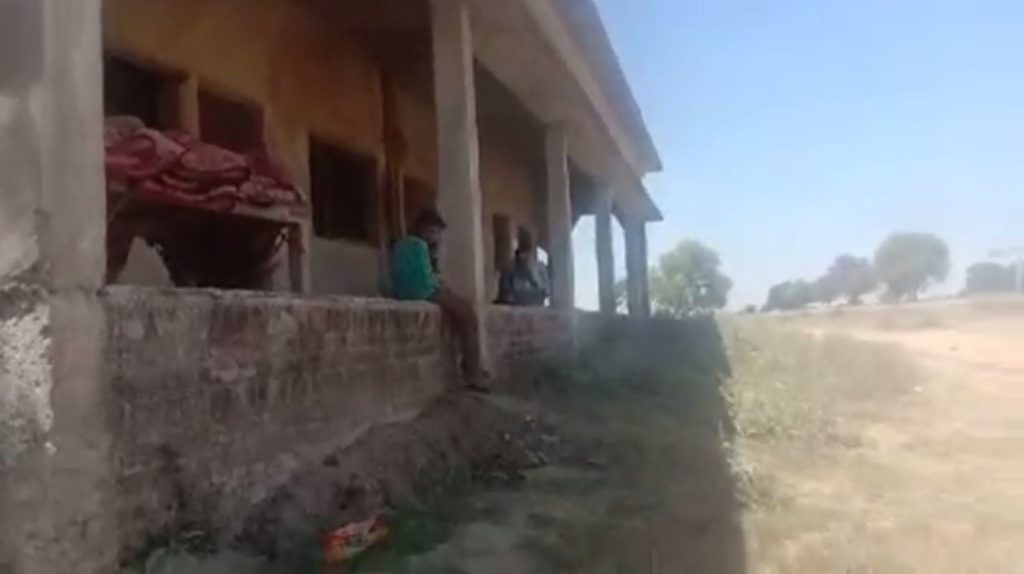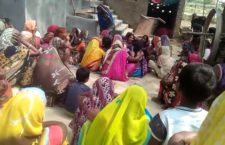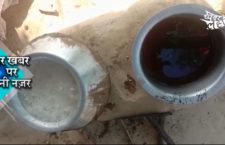Even as UP govt appeals for calm, ramps up quarantine centres, delayed action turns a public health crisis into a humanitarian one
At some distance away from Kamasin in Banda, Uttar Pradesh, the dense foliage of the jungle parts to reveal a ramshackle, dilapidated building. Once a college, the structure has now been repurposed to serve as a quarantine centre for returning migrant workers to weather the storm that is the coronavirus and its handmaiden, the nationwide lockdown.
Four men wait listlessly on the porch for some news, some help, some food – anything. They are just the “lucky” few of India’s 120 million migrant workers who survived the journey home on foot, after Prime Minister Narendra Modi announced the nationwide lockdown to combat the spread of the coronavirus on 23 March with just four hours of notice. Yet, they cannot rejoice at their homecoming.
Aravind Yadav, one of the labourers, says, “When we first got here, we had to go get tested. The doctor cleared us. After that, the secretary called us to the college. But, when we reached here we realised that there were no arrangements made for us.”
Yadav narrates his experience in one of the 2,230 coronavirus quarantine camps in Uttar Pradesh created to feed and house migrant labourers who have been displaced due to the lockdown that mandated a shutdown of all non-essential businesses. There are over 26,476 such camps across India, with Kerala, Maharashtra, and Uttar Pradesh leading the numbers. However, these relief camps are proving to be far from reassuring.
Yadav further adds, “At night, we have to sleep here — there are 4 of us left. There is no homeguard, no provisions for our safety. Mosquitoes bite us, there are no lights or fans. They don’t even give us proper food. Sometimes, someone will wander in with food at 12 or 1 in the day… the village head sends the food, who knows where he gets it from. We know nothing. This is our condition. No one comes to check in on us, to see whether we’re dead or alive. They’ve just stashed us in this jungle.”
“Snakes and scorpions can bite us here, in this old building. If something happens to us, there is no one to check in on us at night. We can’t even use our phones, since there is no electricity to charge them. So we can’t even call our families if something happens,” he adds.
A cleaner at a FedEx office in Delhi recounts his harrowing six-day walk to his hometown in Kamasin after his business was shut down, and the conditions that awaited him at the facility. “We couldn’t find any water, our feet have blisters. All of our shoes broke on our long walk here. We were just trying to get home in these arduous circumstances. Now that we’ve got here, we’ve been locked up and told to stay put,” he said. The worker spoke of the devil-and-deep-blue-sea situation he’s in, “All the companies have shut (back in Delhi), so I could not arrange for food and I came here. But it’s the same here.”
Ashok Kumar, a worker from Delhi and erstwhile resident of Kamsin, concurs, “I came by foot, somehow. My hands and feet have blisters and are all worn down. Sometimes I just couldn’t walk, and so I’d lay down by the side of the road. There were no running cars or even bullock-carts to be able to hitchhike.”
The lockdown has devastated an already flagging economy, growing at a snail’s pace of 4.7 percent. As of January 2020, 7.16 percent of India is unemployed, leaving a large section of its population vulnerable. It is no surprise, then, that the lockdown has pushed an already precarious population to conditions of desperation, triggering a mass exodus of migrant labourers from cities back to their homes, hundreds of kilometres away.
These migrant labourers form 20 percent of the nation’s workforce. Further, anywhere between 85 percent to 94 percent of India’s labourers belong to the informal sector, which accounts for almost 50 percent of the national income. These migrant labourers within the informal sector earn barely enough for their subsistence and have no socio-economic safety nets, contracts, or safeguards to help them tide through tough times. In Yadav and Kumar’s case, the state is failing its poorest citizens, who are eager to cooperate with the law if it means that they can go home again. First ousted from the cities they helped to build, their village homes too have been rendered a nightmare because of the trials that await them in State-mandated quarantine.
Neither Kamasin’s inhospitable quarantine facilities nor the presence of their community, are wont to offer some comfort to the workers.”We have one drum barely of potable water. If you go to someone else’s tap, they accuse you of carrying coronavirus and polluting their tap, and forbid you from coming there anymore. We’ve come such a long way on foot, and there have been no arrangements for us here. In fact, we’re more likely to fall ill here, and then, who will treat us? They’ll let us go in 14 days and evade responsibility if we fall sick the day after. Then, our families will have to take care of us and arrange for medicines. We are mandated to stay here, so they should at least take care of us. Otherwise they should let us go,” Kumar said.
He further added, “One boy fell ill. We have been trying to contact the pradhan (chief) and the supervising officer since 3 pm, but there has been no response. We called an ambulance, they said they could only come by 6 om, after almost 2-3 hours. When someone is dying, why are they asking us to wait for 3 hours? This is why we finally had to walk and take the boy to the government hospital.”
“The Secretary tells us that there is no other arrangement that can be made here, and that we can order food from our houses if we want special treatment. He tells us that we can go home if we want, and to not ruin his mood or bother him. If he sends us food, it’s stale or uncooked food, often leftovers that are going bad. Now tell me, won’t people get sick eating food like that?” asked Kumar.
The Centre has announced a $23 billion welfare scheme for the poor to offset the current emergency. This move was widely criticised as inadequate, and as merely a rebranding and tweaking of pre-existing schemes. Further, the central government’s orders that states provide food and shelter to its vulnerable populations through relief camps to prevent a migrant exodus proved to be too late to be effectively executed.
Delayed action turned a public health crisis into a larger humanitarian one, as evinced by the testimonies of the labourers stranded near Kamasin. And as always, there is some impasse between what measures are announced and what is actually implemented on ground. Kumar said, “We even went to the higher ups, and asked them to give our families written notice that they are responsible for anything that happens to us. They refused. They said they were following orders from above. So we said, then use the funds they have given you to make the necessary arrangements for us! They have no response.”
“Now it’s been two days since they’ve called us. We even got tested, and were locked up in the DGIS Inter College, and they still haven’t made any proper arrangements for us. Now tell us, how can we stay like this? There has to be some proper facility now. They are being paid to keep us by the government, this is not just some arbitrary exercise. Five men even ran away. Now there’s just the four of us left. What do we do? In the village, there’re three more people from ‘outside’, they’re still not being brought to this facility. They’ve stashed a few of us here just to save face and prove a point. Now what is to be done? Either take care of us, or let us go.”
Ostracized by their neighbours for allegedly being vectors of the virus, denounced by the state, and even abandoned by their families who need to keep working to put food on the table, these labourers are marooned. The Prime Minister has since announced an extension of the nationwide lockdown until May 3, triggering yet another large scale movement of populations eager to return home. As the recent violence in Surat and Mumbai has demonstrated, the state’s preparedness remains woefully inadequate. Lockdown 2.0 doesn’t bode well for India’s poorest; they are being forced to fight for their dignity just as hard as they have to fight for their lives. As Aravind Yadav laments, “They feed us like we are dogs. They say we’re not guests. We may survive corona, but we won’t survive this.”
This article was first published in Firstpost.
Also Read:
In UP’s Mahoba, migrant labourers’ families say nights sleepless, pockets empty and future uncertain
No food, no water, no money
Migrant workers of rural Uttar Pradesh fight for right to work to ensure dignified living
Return of the migrant
Serpentine queues for Rs 500, endless wait to travel home


